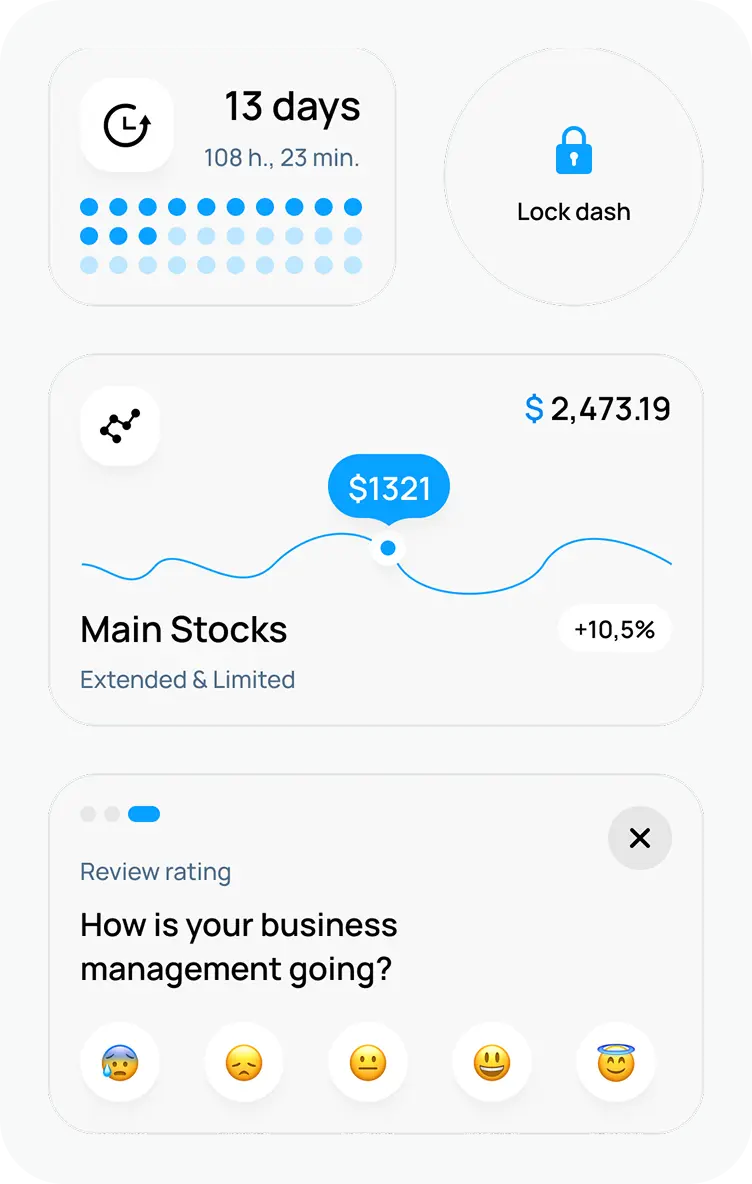Angular Alternatives: Which Technology To Choose In 2026?
October 27, 2024•6 min read

I hope you enjoy reading this post. If you want us to do your frontend development or design, click here.
Author: Alex Vasylenko | Founder of The Frontend Company


Before we get into alternatives to Angular, let's clear up a common misconception. Many articles across the web are titled "Angular Alternatives," but in reality, they discuss alternatives to AngularJS — a framework that is dead and no longer supported.
It can be confusing, as Angular and AngularJS are two different frameworks, each with its own use cases and purposes.
I want to make sure our readers and clients understand this. When researching alternatives, you have to know what exactly you are looking for. Be careful when reading such articles!
Our blog will focus specifically on Angular, a TypeScript-based framework used in modern web development. I will explore the available options and discuss the reasons why some companies look for alternatives to a framework that is still relevant today.
Why Businesses Consider Alternatives to Angular
One of the main reasons businesses are looking for alternatives to Angular is its decline in popularity.
Despite Google's framework was the leader in frontend development in 2018, developers have moved on to tools that offer a simpler experience and fully meet client needs.
Angular Verbosity and Component-Based Architecture
One of the core issues with Angular is its daily routine work.
Its component-based architecture requires breaking down user interfaces into separate components. While this allows to reuse code and organize everything better, developers spend a lot of time writing boilerplate code that doesn't develop the project in general.
It makes Angular less profitable than more streamlined tools, where your team can focus on important parts of the project without getting slowed down by the daily tasks.
For smaller teams or projects, the time spent on such tasks can be a big drawback and lead to Angular alternatives research.
The Complexity of Learning and Maintenance
Angular's complexity is another big factor that makes businesses look for alternatives. What is challenging? It requires a deep understanding of TypeScript and additional concepts like Modules, Services, and Dependency Injection.
Managing all these different pieces can feel overwhelming, especially for teams not deeply experienced with the framework.
Moreover, even basic troubleshooting requires extensive research because its error messages are often cryptic.
As a result, companies may find it more cost-effective to go for a simpler tool and do faster onboarding and development.
Performance
While Angular uses the familiar Model-View-Controller (MVC) pattern, which separates the application into three interconnected parts — Model, View, and Controller — its performance can sometimes be a bottleneck.
Angular's two-way data binding feature, which keeps the user interface and internal data synchronized in real time, can negatively impact performance in large applications where constant data syncing can cause lags in the system.
Users are not patient. They feel frustrated when your application or website slows down. With each millisecond of delay, the likelihood of them quitting increases, resulting in lost clients and money.
That's why many companies aim to offer fast and seamless user experiences, choosing more efficient and lightweight tools.
Angular can be overkill for your project
Google's framework is robust, and thousands of projects have been built with Angular, but it has big disadvantages for small and medium projects.
For those who are looking for more business-oriented solutions, check out my list of Angular alternatives I've chosen based on the following criteria:
Popularity Among Developers. The more popular a tool, the larger its talent pool and available resources.
Ease of Learning. Some tools are easier to pick up, especially for teams with varying experience levels.
Performance. I evaluated how well each tool handles different applications and provides fast, responsive user experiences.
Integration. A good tool should work well within a diverse tech stack.
Next, let's go over some popular Angular alternatives.
Need To Find Good Angular Alternative?
Review of popular Angular alternatives
React

Honestly, when you are thinking of migrating from Angular, React is one of the top choices in 80% of cases. For good reason: React holds a leading position among the most-used technologies by software developers. According to a Statista study, it is used by 39.5% of experts, while Angular is used twice less (17.1%). Moreover, Angular's popularity is decreasing every day.
Another reason why React is one of the best alternatives to Angular is its simplicity and flexibility. Unlike Angular, which is a full-fledged framework, React is a JavaScript library. This gives developers more freedom to choose how to structure their applications.
Moreover, React has a lot of add-ons that allow developers to easily create dynamic user interfaces.
Another big advantage is performance. React uses a virtual DOM, which means it can update only the parts of the UI that has changed instead of reloading the whole page. This makes React very efficient for applications that need real-time updates or dynamic content.
Compared to Angular's two-way data binding, which can sometimes slow down large applications, React's approach is faster and less resource-hungry.
Pros:
Industry Agnostic: React is suitable for various industries, including e-commerce, automotive, and media, making it a versatile option for building web applications.
Code Reusability: React’s structure is flexible so developers can reuse code. This eliminates the need to rewrite code sections, significantly speeding up the development process.
Scalability: React's architecture is perfect for building large web projects. Developers can quickly scale applications and add new functionalities. The JavaScript library is well-suited for these kinds of modifications.
Huge Community: As one of the most popular frontend technologies, React has a massive community. So, finding resources, libraries, and experienced developers is rarely an issue. The frequent updates and improvements from Meta (Facebook) ensure that React is always up to date with the latest trends and needs in web development.
Easy Transition to Mobile: If you decide to build a mobile app with React Native, your development team will find it easy to adapt.
Fast Performance: Applications built with React run fast and smoothly on desktop devices.
Cons:
Loose Architecture: React's flexible architecture requires more attention to code organization. Without proper planning, the architecture of the web application may become problematic over time.
Additional Tools: One of the downsides is that devs must learn several related tools to use React effectively.
Initial Confusion: Although React is relatively easy to learn, devs may experience some initial confusion when getting familiar with the technology and its ecosystem.
📔 Note: If your development team asks to migrate to React, their request might be worth considering. React's flexibility and performance benefits can speed up development and improve user experience, which are crucial for any growing business.
Vue.JS

Vue (pronounced like view) is an excellent Angular alternative, as it is also a framework where devs can do the same job but with several advantages. It builds on top of standard HTML, CSS, and JavaScript and provides a declarative, component-based programming model to efficiently develop UI of any complexity where performance and adaptability matter.
Moreover, Vue.js is much easier to learn. While Angular requires a deeper understanding of TypeScript, modularity, and many built-in tools, Vue.JS provides flexibility and simplicity, allowing developers to understand and implement the framework quickly.
Vue.JS integrates easily into existing projects and can work alongside other libraries or frameworks. You don’t need to overhaul the entire project if you want to add Vue to an existing application. Conversely, Angular requires total control over the project, making integration into existing codebases impossible.
Pros:
Flexibility and Simplicity: Vue gives developers more freedom in structuring their applications than Angular.
Lightweight and Fast: Vue is lightweight, resulting in faster load times and better overall performance, especially in smaller to medium-sized applications.
Component-based Architecture: Vue allows developers to create reusable components, simplifying the maintenance and scalability of large projects.
Cons:
Smaller Ecosystem: While Vue is growing, it still lags behind Angular in terms of ready-made solutions, tools, and plugins for complex enterprise-grade applications.
Limited Corporate Adoption: Vue is popular among smaller projects and independent developers but is not as widely adopted by large corporations as Angular or React.
This is why devs call Vue "The Progressive Framework": it's a framework that can grow with you and adapt to your needs.

Transform your UI for peak performance!
🔹
Unlock seamless, high-performance frontend solutions tailored to your business.
🔹
Get an interface that outshines competitors and delights your users.
jQuery

jQuery is a fast, small, and feature-rich JavaScript library that has been popular for many years. It simplifies common tasks in web development with an easy-to-use API that works across many browsers.
"Getting started with jQuery can be easy or challenging, depending on your experience with JavaScript, HTML, CSS, and programming concepts in general." - jQuery.
It's true. All the power of jQuery is accessed via JavaScript, so having high skill in it is required to understand, structure, and debug your code.
But it is worth it because jQuery is the perfect tool for projects where you don't need complexity and want to handle everyday tasks quickly. Even with the rise of modern libraries like React, jQuery is still one of the best Angular alternatives.
Pros:
Cross-browser Compatibility: jQuery ensures consistent behavior across different web browsers, solving many compatibility issues developers face when writing vanilla JavaScript.
Simplified DOM Manipulation: jQuery makes it easy to select, manipulate, and modify HTML elements, reducing the amount of code.
Large Ecosystem and Support: With a long history and widespread use, jQuery has a huge community, extensive documentation, and many plugins and extensions.
Great for Legacy Projects: jQuery is still widely used in older web applications, making it a must-have tool for maintaining or upgrading legacy projects.
Cons:
Outdated for Modern Development: While useful in the past, jQuery has been replaced by modern frameworks and libraries like React and Angular, which offer more advanced features for building complex applications.
Performance Issues in Large Applications: jQuery can be less efficient than modern frameworks when used in large or complex applications, as it lacks the optimization capabilities of more modern tools.
With its versatility and extensibility, jQuery has changed the way millions of people write JavaScript.
Svelte

Svelte is another framework for building user interfaces on the web. It uses a compiler to turn declarative components written in HTML, CSS, and JavaScript into lean, tightly optimized JavaScript.
What makes it a good Angular alternative is speed in smaller projects as it handles changes directly in the DOM without needing a virtual DOM like Angular.
Moreover, Svelte has fewer complexities than Angular. It doesn't require deep knowledge of modules, services, or state management libraries, making it easier to learn and faster to implement.
Devs use this framework for many projects, from standalone UI components to full-stack web applications.
Pros:
No Virtual DOM: Svelte eliminates the overhead of a virtual DOM by rendering components during the compile step. This means faster load times and better overall performance, especially for small to medium-sized applications.
Lightweight and Minimalistic: Svelte applications are often smaller than Angular apps, resulting in quicker load times and a better user experience, especially on mobile devices or slower networks.
Cons:
Smaller Ecosystem: Svelte is new and has a smaller ecosystem than Angular. This means less pre-built solutions, third-party tools, and community support, making it harder to find help or resources for complex use cases.
Limited Corporate Adoption: Svelte is growing in popularity, but it has not achieved the widespread enterprise adoption of frameworks like Angular or React.
Conclusion
The number of Angular alternatives is beyond the technologies we mentioned above. Different options serve different things. Frameworks like Angular and Vue.js are ideal for large-scale projects where structure, scalability, and a well-defined architecture are crucial.
On the other hand, libraries like React are for projects where flexibility and the ability to customize your tech stack are priorities. It is especially useful for projects requiring a lighter, more flexible solution focusing on user interaction.
To successfully migrate to another technology, you need a reliable partner with an experienced team and find the best tool possible.
💡 The Frontend Company has experience in guiding businesses to find the best Angular alternatives and migrate to modern technologies smoothly and efficiently. Contact us today for a consultation, and we’ll find the best solution for your project.

Unlock the full potential of your product

Boost customer retention & satisfaction

Become more competitive on the market

Move to the latest technologies stacks

Improve usability & visual appeal
FAQ

Alex Vasylenko is the founder of The Frontend Company, DBC and several other successful startups. A dynamic tech entrepreneur, he began his career as a frontend developer at Deloitte and Scandinavia's largest banking company. In 2023, Alex was honored as one of 'Top 10 Emerging Entrepreneurs' by USA Today.
RATE
Rate this article please
This will help us provide more useful information.
5093 ratings, average 4.86 out of 5
